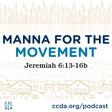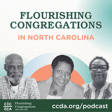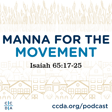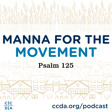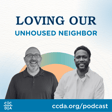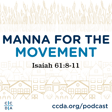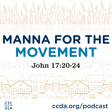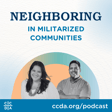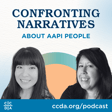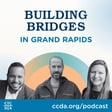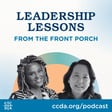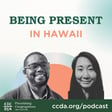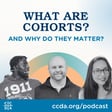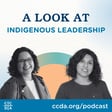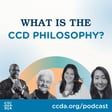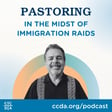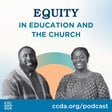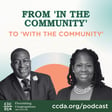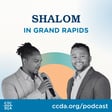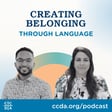Become a Creator today!Start creating today - Share your story with the world!
Start for free
00:00:00
00:00:01

BONUS: Mental Health Awareness Month
Each May, CCDA offers events, trainings, and resources at the intersection of faith and mental health.
In this bonus episode, Lyndal Bedford, CCDA’s Behavioral Health Affinity Network co-leader, explores how CCD practitioners are incorporating mental health practices into their organizations and contexts.
First, you will hear Lyndal’s conversation with CCD practitioners Dr. Jeff Biddle and Turan Rush from the Midian Leadership Project in Charleston, West Virginia. Then, you will hear his conversation with Stephanie Ann Vander Lugt from Kinship Plot in Charlotte, North Carolina.
For more information about CCDA’s mental health offerings, visit ccda.org/mentalhealth.
Recommended
Transcript
Introduction and Overview
00:00:00
Speaker
Welcome to CCDA's Mental Health Awareness Month Special Edition Podcast.
00:00:05
Speaker
In May each year, CCDA hosts Mental Health Awareness Month to provide an opportunity for awareness and learning at the intersection of faith and mental health.
00:00:15
Speaker
We hold space from deepening our understanding, conversations, and engagement with the CCDA community with lived-experienced mental health survivors, licensed professionals, and CCD practitioners.
00:00:28
Speaker
Our CCDA Behavioral Health Affinity Network teaches how incorporating CCD holistic approaches to mental health can restore and transform community life and ministry.
00:00:40
Speaker
Check out more at ccda.org slash behavioral health for more information.
00:00:46
Speaker
Today, the co-leader for CCDA's Behavioral Health Affinity Network, Lyndall Bedford, explores how CCD practitioners are incorporating mental health practices into their organizations and contexts.
00:01:00
Speaker
Lyndall is a professor and licensed clinical social worker in Central Florida.
00:01:06
Speaker
First, you'll hear him speak with Dr. Jeff Biddle and Teran Rush, founders of Midian Leadership Project from Charleston, West Virginia.
00:01:14
Speaker
His second conversation is with Stephanie Ann Vanderlucht from Kinship Plot in Charlotte, North Carolina.
Midian Leadership Project: Vision and Community Impact
00:01:22
Speaker
Have a great mental health month.
00:01:34
Speaker
Ian, thank you guys so much for coming on.
00:01:36
Speaker
Really appreciate you guys doing this.
00:01:39
Speaker
So why don't you guys tell us first a little bit about your organization and what you guys do.
00:01:44
Speaker
Love to hear more about just kind of the work that you all are doing.
00:01:48
Speaker
So the Midian Leadership Project, our main focus is to build the community using holistic leadership and educational, also while using sports.
00:02:00
Speaker
So it's like
00:02:01
Speaker
We got coaches that connect to the local sports teams and we work with them hand-to-hand and help them out and help them build leaders so we can keep building a cycle.
00:02:11
Speaker
The thing about the Medium Leadership Project is that everyone is hands-on with the sport teams and is working in the building.
00:02:18
Speaker
They're from the community.
00:02:19
Speaker
So all the kids that we deal with on a day-to-day basis, we understand the circumstances they're coming from and what they got to deal with outside of school and deal with the home life and
00:02:29
Speaker
how they, how they is growing up in the neighborhood and things like that.
00:02:32
Speaker
So the relationship, each of it is the most important because we build a relationship with the youth and the young adults and they're able to come here and get the resources that they need to be successful.
00:02:43
Speaker
Whether that's in our sports or whether that's in their coming to get better in tutoring for the education, whether it's coming to Bible study, whatever it may be.
00:02:52
Speaker
So the relationship piece of it all is the most important thing that we use for the foundation of the Media Leadership Project.
00:02:59
Speaker
So how did you guys get started?
00:03:01
Speaker
How did the organization come to be?
00:03:05
Speaker
So it's very interesting.
00:03:06
Speaker
So growing up, I met Jeff through Bible study when I was around 11, 12 years old.
00:03:12
Speaker
And we also went through an after school program called Emanuel.
00:03:17
Speaker
So we knew when we was playing sports and we had practice and things of that nature, we didn't have nowhere to go to get like tutoring or have Wi-Fi access after our extracurricular activity was over because it usually be like 7, 30, 8 o'clock by time.
00:03:33
Speaker
we would need to have the resources and get help with homework and things like that.
00:03:37
Speaker
So we knew that for the kids at sixth grade and up to young adulthood to age 25, we needed somewhere in our community to where they can still go be a part of extracurricular activities and after that can still come somewhere and have a home to have the resources like getting tutoring and
00:03:55
Speaker
using a facility for Wi-Fi, or coming somewhere safe, you know?
00:03:59
Speaker
So we knew, like, after sixth grade, it was nowhere for sixth graders enough to go to.
00:04:03
Speaker
So we knew that it was important to have something like that in our community.
00:04:06
Speaker
So a lot of the guys went to college and went away for a couple years.
00:04:11
Speaker
And Biddle and we had two guys, Tyrell and Terry, they came to Biddle and said, we need to hurry up and get a spot.
00:04:20
Speaker
Because there was a lot of crazy stuff going on in the community, and we knew that we was going to be the ones to
00:04:25
Speaker
you know, have to make this community better for that specific age group.
00:04:30
Speaker
So they did all the work trying to find the building.
00:04:33
Speaker
They went meeting after meeting, search after search, search after search.
00:04:37
Speaker
And they finally, we were blessed by the Lord to have this location we're at right now.
00:04:41
Speaker
So during my time when I was at Eastern Michigan, me and Biddle would have a lot of phone calls, a lot of Zoom meetings and stuff like that.
00:04:48
Speaker
Biddle would come up there, do interview me and stuff like that.
00:04:52
Speaker
So it was years prior to work, but
00:04:55
Speaker
it definitely like means a lot to, you know, have a place like this.
00:05:00
Speaker
So, but that's, that was the process of why it was important to have a building like this in our community.
00:05:07
Speaker
Okay.
00:05:08
Speaker
That's all.
00:05:09
Speaker
That's amazing.
00:05:10
Speaker
And how, how long have you guys been doing the work so far?
00:05:14
Speaker
So the building was open a year when I had my last for college.
00:05:18
Speaker
The building was open to the community for a year, but it wasn't renovated yet.
00:05:22
Speaker
So since the renovations, we've been open two years.
00:05:25
Speaker
So three years in total, but two years where it was like full access to the community and for the kids.
00:05:30
Speaker
So these last two years, we had a gym in here, computer lab, training facilities, library, hangout areas, social areas for the kids, couch space and stuff like that.
00:05:43
Speaker
And it really has been a blessing, you know, just for me, like specifically, because I grew up here and like growing up, we didn't have nothing like this.
00:05:53
Speaker
Like we was blessed to have what we had in the after school programs that we had access to.
00:05:57
Speaker
But having something like this where you can just feel free
00:06:01
Speaker
feel like you love, you're safe and be whatever you want to be and be able to look at someone in your community that you look like that understands you to reach out for help and knowing that you've got the support that you need to be successful every day.
00:06:15
Speaker
And we open to 8 o'clock.
00:06:17
Speaker
So you can come back after your extracurricular activities and still be able to get the help you need.
00:06:23
Speaker
So we have been beneficial to a lot of the people in the community.
00:06:29
Speaker
I'm just trying to do the Lord's word.
00:06:31
Speaker
That's really...
00:06:32
Speaker
what it boils down to.
00:06:33
Speaker
It's like you guys are really doing great work in the community.
00:06:36
Speaker
And honestly, thank the Lord for you guys for what you're doing.
The Healing Power of Sports
00:06:40
Speaker
So as we kind of talk a little bit more about kind of some of the mental health pieces, we know that mental health, of course, is affecting communities in different ways.
00:06:49
Speaker
So I kind of wanted to touch on and ask you guys, you know, how is it mental health is kind of affecting your community and maybe some of the work that you guys are doing kind of on a daily basis?
00:07:00
Speaker
What are things that you're noticing?
00:07:02
Speaker
from community members?
00:07:04
Speaker
And are there resources that are available from either from your organization or people you partner with that's helping community members with their mental health?
00:07:13
Speaker
Well, back in 2019, when COVID first started, I think the whole world didn't understand how important mental health was until everything came to an instant stop and you couldn't really live like live how we used to live.
00:07:27
Speaker
So during that time, everyone's mental health
00:07:31
Speaker
was on a decline.
00:07:33
Speaker
You know, it was just something new, something hard to be a part of and to be like living like that.
00:07:38
Speaker
And we was not used to living like that.
00:07:40
Speaker
So our community was definitely, the world was affected, but speaking for our community was definitely affected by it deeply.
00:07:48
Speaker
And I think having something like this as far as the mental health things,
00:07:53
Speaker
Just having an area to be safe and, you know, just calm and chill.
00:07:59
Speaker
Like, it's good for the kids mental, especially when they on an uprise with COVID.
00:08:04
Speaker
Like, a lot of those kids during COVID wasn't going to school every day, wasn't getting the resources they need, wasn't able to get the proper nutrition in their household.
00:08:11
Speaker
Like, so a lot of these kids is just running on survival mode.
00:08:16
Speaker
But these last couple of years, especially seeing them come through the building, you just you can just see the spark and the light now because they have something to be proud of.
00:08:25
Speaker
Because.
00:08:27
Speaker
We may have did the hard work, like getting all this stuff and getting renovations and going to me as a fundraiser.
00:08:33
Speaker
But it's really like.
00:08:34
Speaker
This is literally there's the youth.
00:08:37
Speaker
So like the mental health for the youth and the young adults.
00:08:41
Speaker
have been helping their mental health a lot.
00:08:42
Speaker
Just having as simple as just having a safe place to be away from all the craziness from the world, you know?
00:08:49
Speaker
So like, yeah, that's just the one, that's one aspect of it from my perspective.
00:08:55
Speaker
Well, and one of the things that, one of the things that has been a key value for our organization is learning how to make the best use of
00:09:04
Speaker
of the way that sports has a positive impact on young people's mental health.
00:09:09
Speaker
A lot of the research is really putting into scientific terms things that we might have known instinctively.
00:09:16
Speaker
I think that for 75 years or more, people understood that football players were doing something that helped them develop leadership skills, that they were doing something that helped them deal with their anger issues.
00:09:27
Speaker
But we have a lot better vocabulary now for what is happening in terms of trauma healing in athletics.
00:09:35
Speaker
And there's something really cool going on in the brain where your hippocampus is your learning center.
00:09:41
Speaker
And when you're triggered by, you know, the memory of trauma,
00:09:44
Speaker
Learning center shuts down and you go into survival mode, as Turan described.
00:09:48
Speaker
And we had so much survival mode over the last few years.
00:09:52
Speaker
But the thing is that the hippocampus is turned back on by muscle memory.
00:09:55
Speaker
And so this idea that when I'm playing sports, I'm more free to learn.
00:09:59
Speaker
This idea that when I'm playing sports, I'm able to be courageous in a different way.
00:10:03
Speaker
It has this scientific basis that we've been able to put our finger on.
00:10:06
Speaker
And the other thing about sports is it simulates a traumatic environment, but it's not actually unsafe.
00:10:12
Speaker
And so, you know, you're crashing into people, you're in competition with people, you're making last minute judgments about how you're going to make it or not make it across, you know, the line of scrimmage or make it to the basket.
00:10:22
Speaker
And you're simulating something that challenges you and turning your learning center back on so that you can rewire your response to things that you find stressful and traumatic.
00:10:34
Speaker
And so that's been a huge part of the work we've done.
00:10:36
Speaker
And we've been really happy to partner with the Up To Us Sports Network, which both does research and then places, many of our coaches are placed by the Up To Us Sports.
00:10:45
Speaker
We recruit them from our own community, but then they're trained and placed back with us, so to speak, by the Up To Us Sports Network, which does a lot of research and training about how to use sports for trauma healing.
00:10:57
Speaker
And an element of that that
00:10:59
Speaker
I've really been able to learn a lot from Tren about is educational trauma.
00:11:04
Speaker
We found the idea that, you know, we all kind of know in CCD work about savior complexes and people who believe they have the solution for the whole community, but there is an educational savior complex, so to speak.
00:11:17
Speaker
The idea that school is the answer, that school is going to change everything.
00:11:20
Speaker
And we have seen, especially with the schools here, it is hard to get educational institutions to see
00:11:28
Speaker
when they are inflicting the trauma rather than healing it.
00:11:31
Speaker
And there's this whole concept that, oh, childhood trauma, these kids have bad home lives and we, the school, are going to do something trauma-informed to save them.
00:11:40
Speaker
But that really projects all of the problem back onto the student and their family and almost demonizes the community in the process when oftentimes with issues related to what we might call the school-to-prison pipeline, it's the educational institution itself.
00:11:56
Speaker
that is inflicting that trauma.
00:11:57
Speaker
It's the educational institution itself that is making the kid feel unsafe and exposed to danger.
00:12:02
Speaker
It's the educational institution itself that is not recognizing leadership potential, but instead is punishing the sort of things that would lead to leadership and transformation.
00:12:12
Speaker
And so a lot of what we've seen is that athletics is an area that can heal that.
00:12:17
Speaker
And so with the COVID and the closures and everything on top of the educational trauma already experienced by a lot of urban students, we've been able to latch onto athletics as an area of leadership development and specifically trauma healing for those impacted by the school to prison pipeline.
00:12:33
Speaker
And I learned a lot of what I know about that from Teran and kind of his experiences.
00:12:38
Speaker
Yeah.
00:12:38
Speaker
So, um, Biddle speaking on our sports can help trauma.
00:12:44
Speaker
Playing football, to me, was my coping mechanism.
00:12:49
Speaker
Even when he talked about the school-to-prison pipeline, luckily I wasn't affected personally.
00:12:55
Speaker
My friends have benefited from that.
00:12:58
Speaker
The school putting a trauma on the kid.
00:13:02
Speaker
They don't really get to build a relationship with the kid.
00:13:05
Speaker
It's all off the judgment of who they are, what community they come from, how they look.
Holistic Mental Health Approaches
00:13:10
Speaker
Stuff like that, you know?
00:13:11
Speaker
So, but when you play sports, all that stuff go away because like you just feel free.
00:13:18
Speaker
You know, you can, like you can play with your teammates, you run in tackling, you get excited when your teammates score touchdowns, you might fall, get hurt.
00:13:25
Speaker
You got someone that can pick you up and cheer you on when you not in the mood or you feeling a little sore.
00:13:30
Speaker
So like all those things that life that you can learn from like a therapist and stuff like that, sports does that.
00:13:37
Speaker
Like,
00:13:38
Speaker
And this organically happens because I can trust my brother to do his job so we can score touchdowns.
00:13:45
Speaker
I can trust my brother to block his man so I can go make the tackle or whatever.
00:13:49
Speaker
So it's all them components you can get from life.
00:13:53
Speaker
When you play sports, you can get the same thing.
00:13:55
Speaker
And like Jeff said, we put our finger on the research of like, wow, we can heal trauma while playing sports because how the brain can be worse.
00:14:03
Speaker
And if sports aren't so much for me and my friends, like, so that's another thing too.
00:14:10
Speaker
Like we give the kids opportunity to come here, play sports, build bonds, build relationships so they can be tight knitted and they can get that love and get that honor and, and get and build their dignity back up from playing sports because they know when they surrounded by our
00:14:28
Speaker
the team, the love, the community of sports, they feel love.
00:14:32
Speaker
Even if the school system is not handling them correct like they should, but they know when they can come here and play sports and get the love from their friends in the community, the leaders in the community, things of their nature.
00:14:46
Speaker
But yeah, so that's how important sports is.
00:14:50
Speaker
And that's like, it definitely can heal trauma because it healed a lot of my trauma.
00:14:54
Speaker
Being around loved ones, like in
00:14:56
Speaker
I didn't understand it until I got away from it.
00:15:00
Speaker
Like practice just feel like practice until you go and do something.
00:15:04
Speaker
And then you get to be around the people that you really love, the people that's blood, sweat, and tears every day, that's working hard with you, that's trying to reach a goal with you, that's, you know, trying to obtain the same lifestyle as you.
00:15:16
Speaker
So, like, the whole time you think, like, wow, I'm really happy.
00:15:19
Speaker
I feel accomplished.
00:15:21
Speaker
But your brain is, like, doing, is chemically working like that because that sports is healing all those traumas you've been through.
00:15:28
Speaker
Right.
00:15:29
Speaker
Same thing, pass me a basketball, then I pass it to my other teammate and he hits a three-pointer.
00:15:33
Speaker
We all going to celebrate together because it's like family bond.
00:15:37
Speaker
I'm proud to see my family member, my teammate do well.
00:15:41
Speaker
When I do well, people congratulate me.
00:15:43
Speaker
When I don't do well, people let me know, but they also build me back up, restore me.
00:15:48
Speaker
from my action that I didn't do good.
00:15:50
Speaker
So things like that, like the restorative part is not in the school system.
00:15:54
Speaker
It's specifically around here in our community.
00:15:56
Speaker
So you try to do stuff more restorative based, trying to help the individual learn from their mistakes and get better from the mistakes instead of being punitive and disciplined.
00:16:09
Speaker
Like, they just a kid.
00:16:10
Speaker
They're learning who they are, what they want to be.
00:16:13
Speaker
Like, who are they to this world?
00:16:14
Speaker
So, like, we take that away from them when we, it's all discipline, all opinion.
00:16:18
Speaker
It's like, oh, you made one mistake.
00:16:20
Speaker
I'm going to send you away.
00:16:21
Speaker
I'm going to kick you out of school.
00:16:22
Speaker
Now, all that trauma, you know, and that's the thing.
00:16:28
Speaker
Like, it seems like it don't happen, but it really does happen, like, worldwide.
00:16:32
Speaker
The school to prison pipeline is, like, the real thing.
00:16:35
Speaker
But when you, you don't really understand it until you see someone that you love, go do it.
00:16:40
Speaker
And that's the thing we're trying to break farther in the medium, the medium industry project too.
00:16:44
Speaker
We're trying to limit the sport and prison pipeline.
00:16:46
Speaker
That's like another big bang when we try to do it.
00:16:52
Speaker
No, that's great.
00:16:53
Speaker
And of course, thank you so much for sharing that part of your story.
00:16:57
Speaker
One of the things that we're talking about, too, and I think you guys kind of made a good point as you guys are talking about it is so we're really trying to focus a lot on kind of a holistic approach when it comes to mental health.
00:17:09
Speaker
So we talk a lot about kind of some of those community aspects.
00:17:12
Speaker
We talk about the physical.
00:17:13
Speaker
We talk about the spiritual.
00:17:15
Speaker
We talk about the emotional.
00:17:17
Speaker
And kind of how all of those bridge together in order to help an individual.
00:17:22
Speaker
You know, we don't want to just kind of focus on one aspect.
00:17:25
Speaker
And it seems like what you guys do at Midian Leadership, you guys kind of encompass all that within your community.
Expanding the Model and Sharing Success
00:17:32
Speaker
So that's really great.
00:17:33
Speaker
And it's like I said, it's really exciting to kind of hear you guys talk about it and talking about even some of those trauma healing aspects of it, because like you guys said, it really is important.
00:17:43
Speaker
And the fact that you guys are using sports to help heal the trauma from a lot of the youth, a lot of your community members, it's just great.
00:17:52
Speaker
What are some things that you guys have kind of seen that God's been doing through your organization that was kind of just unexpected?
00:18:00
Speaker
You know, what are what are some of the kind of those unexpected things that you're seeing?
00:18:06
Speaker
That's a great question.
00:18:07
Speaker
So recently, the last couple of months with the nonprofit world is where you got to be careful as far as bringing religious stuff into it, because, you know, especially people that's getting money.
00:18:19
Speaker
But we know like all this was not possible for what the Lord's word like.
00:18:23
Speaker
The Lord will be blessed us with all this stuff that we have now.
00:18:26
Speaker
So we knew there was no running from that.
00:18:28
Speaker
So we made a decision, like, we're going to incorporate the Lord.
00:18:32
Speaker
We wouldn't have this.
00:18:33
Speaker
This is literally all his work.
00:18:35
Speaker
He just used us to do his work.
00:18:37
Speaker
So we incorporated Bible study on Wednesday, and we didn't see, when we first started the Medium Leadership Project, like, Bible study on Wednesdays wasn't a thing.
00:18:47
Speaker
Like, that way, we were just like, we're going to open up.
00:18:50
Speaker
I'd be a resource center for the community and things in Red Nation.
00:18:53
Speaker
But the last couple months, man,
00:18:56
Speaker
A girl named Caroline, Jeff, Steve Brown, me, and a couple other guys have been helped organize in the Bible study on Wednesday.
00:19:06
Speaker
And a lot of the kids that come here just to chill and hang literally stays for Bible study.
00:19:12
Speaker
So that's like when you think of all the hard work and all the meetings and the
00:19:17
Speaker
renovations and doing all this, like, it really was worth it, like, to have a 35-minute Bible study on Wednesday, but that's how we're reaching the kids through meeting and letting them come here, feel home, and then they come into Bible study and learning about Jesus Christ.
00:19:32
Speaker
Like, that is the ultimate, you know, success story.
00:19:36
Speaker
Like, we didn't see this being, like, a religion thing, but, like, really, it is.
00:19:42
Speaker
Like, this is, God used this to bring people to his kingdom, and I think, like,
00:19:48
Speaker
I know that like this is what it's for.
00:19:50
Speaker
So we've been trying to push more towards like bringing people closer to Jesus, using the nonprofit, focusing on that.
00:19:59
Speaker
So it's been definitely been on the uplands.
00:20:03
Speaker
That's great.
00:20:05
Speaker
So what, so overall with the organization, so what are some of the different elements?
00:20:11
Speaker
So if people wanted to kind of learn more about what you guys do, first off, is there a way that they could, do you all have a website that they could go on to communicate with you guys, get in contact with you?
00:20:24
Speaker
How are ways that people can kind of connect to hear more about the work that you're doing?
00:20:28
Speaker
So we do have a website.
00:20:29
Speaker
If you type in Indian Leadership Project, it's the first thing that pops up any search engine you use.
00:20:35
Speaker
But also just coming and seeing it.
00:20:37
Speaker
Like, it's easy to get on websites and read, but the experience of, like, being here and being present, of seeing the kids, like, interacting, loving each other, being friends, and with workers interacting and working off each other, and it was all peer relationship, like,
00:20:56
Speaker
I've known these people for 10 plus years, Biddle and Tyrell and Terry.
00:21:00
Speaker
It's not just like, oh, we just found people that are just good at surrounding the world and we offer them a job.
00:21:06
Speaker
No, we built it from relationship.
00:21:08
Speaker
And that's why it's the only way it works, God in relationship.
00:21:13
Speaker
So that's like, just coming here and seeing it is worthwhile because it's something that you can't,
00:21:18
Speaker
really like read off of paper or read off of a phone or computer
Insights and Advice for Mental Health Advocates
00:21:22
Speaker
screen.
00:21:22
Speaker
Like it's like, if you come here and see it, it means so much more.
00:21:27
Speaker
It's seeing where we started and where we are now.
00:21:30
Speaker
So, but the website is good.
00:21:32
Speaker
If you like want to like, I mean, like the end person is always better.
00:21:37
Speaker
No, that's great.
00:21:40
Speaker
I think that's good.
00:21:41
Speaker
I think a lot of people should be able to go to some of these different communities and just kind of see some of the work that they're doing.
00:21:47
Speaker
Like you said, it's different to just read about it online as opposed to just seeing what you guys are actually doing in person.
00:21:55
Speaker
Are you guys hoping that as you guys are kind of continuing the model that you've created with Midian leadership, are you hoping that you see kind of some of the curriculum and just things that you guys are creating?
00:22:08
Speaker
Do you hope to see that more in different communities or are you just guys just focusing more where you're at?
00:22:16
Speaker
What are you kind of hoping for the future with it?
00:22:19
Speaker
It's in God's hands, but the answer to that
00:22:22
Speaker
A group of friends from Baltimore, Maryland, literally came to her a few months ago to meet with us and hang with us and see how we did it.
00:22:31
Speaker
And they're looking to start something up like this in Baltimore.
00:22:35
Speaker
So, like, yes, that's what it's about.
00:22:40
Speaker
You know, people saying, like, dang, those guys are doing something that the world have never figured out how to do.
00:22:47
Speaker
And they're traveling to little old West Virginia to try to
00:22:51
Speaker
understand how we did it.
00:22:53
Speaker
And the only answer, the really only two answers you can, you can get, you really can give people is the relationship and the Lord.
00:22:59
Speaker
Like, you know, it only works because we really love each other and care and we want to do this for our community.
00:23:06
Speaker
But like, models like stuff like this need to be in more communities, need to be in more states because
00:23:12
Speaker
it allows, you know, kids to be kids and young adults to still believe who they are and know they can be loved and be safe, you know.
00:23:21
Speaker
Because like Biddle said, it's not that much people.
00:23:25
Speaker
We might be, what, only a handful of people that use the research how sports can heal trauma.
00:23:33
Speaker
So that's not like a known thing.
00:23:37
Speaker
Like people have not, a lot of people haven't,
00:23:40
Speaker
process that and I think um it's like it's really special to have a person like Biddle around that can understand like that stuff you know what I'm saying because it really like so much people like can't like fathom like what that really means like
00:23:57
Speaker
Yes, I know the enjoyment of sports.
00:23:59
Speaker
I know what it done for me when I play with my brothers, but I never could have vocalized that to anyone about how my brain was chemically doing all that.
00:24:07
Speaker
But now, when Jeff talks about it and you read it, they're like, whoa, this did make me feel good.
00:24:14
Speaker
Like,
00:24:15
Speaker
my friend making his play did make me feel like, whoa, I'm a part of something.
00:24:18
Speaker
Like, you know, like, yeah, like, I felt, you can feel it, like, you can feel it even in college.
00:24:24
Speaker
Like, I understood that everyone on the team has certain gifts and certain abilities, certain personalities.
00:24:31
Speaker
Like, just being a captain and being leader of the team, like, like, okay, maybe I can spin at him.
00:24:38
Speaker
to motivate him.
00:24:39
Speaker
But maybe one of my teammates, I have to go to the side and talk to him one-on-one or address him a certain way.
00:24:45
Speaker
Like, that's how life is and that's how, like, the brain works.
00:24:49
Speaker
That's how sports, that's what sports does to the brain.
00:24:52
Speaker
So, like, yeah, it's amazing.
00:24:53
Speaker
You know, I can set up playing a ramble all day about it, honestly.
00:24:56
Speaker
But it's really, really good stuff.
00:24:59
Speaker
And I think that's the beauty of CCD work.
00:25:03
Speaker
It's not franchisable.
00:25:04
Speaker
We couldn't just repeat what we did here somewhere else, but a lot of it is shareable.
00:25:10
Speaker
Someone from another city can take what we have learned about ourselves and then draw from the relationships in their community and build something that builds on that.
00:25:18
Speaker
And it is really cool to see how we can share what we're doing in a way that glorifies the Lord by allowing the work to move forward in other places.
00:25:29
Speaker
No, that's great.
00:25:31
Speaker
Thank you guys so much for this information.
00:25:34
Speaker
One of the last things I kind of wanted to touch on and ask you guys is, again, we are focusing, of course, on Mental Health Awareness Month.
00:25:42
Speaker
And we have a lot of practitioners, including myself and advocates who love to just talk about the concept of mental health and what we can do for our communities who are struggling in this area.
00:25:55
Speaker
And so what would be a word of advice that you would give to either a licensed professional, an advocate, anyone that's interested in any type of mental health work?
00:26:05
Speaker
What is kind of some advice that you would give to any of these professionals as it relates to more community development and even based off of some of the work that you guys do?
00:26:18
Speaker
I'm going to refer to.
00:26:20
Speaker
Certainly, I would say athletics are a huge asset.
00:26:24
Speaker
You know, we want to look for what assets, what psychological assets and the social assets in our communities.
00:26:29
Speaker
And athletics can be overlooked at how important it is for the development of our young people.
00:26:35
Speaker
But at the same time, it's all in how you use it.
00:26:38
Speaker
I think part of the research we've been doing, one of the exciting things is sports does not automatically do anything good.
00:26:44
Speaker
It takes parents and coaches and educational professionals and the students being on the same page about what we want to happen here.
00:26:54
Speaker
And so athletics is a huge asset for our students if we use it correctly, if it's something that we are using for development and not simply as a platform for self-aggrandizement or as an unrealistic view of what can happen in the future.
00:27:11
Speaker
But as long as our young people know this is something that is good for you now, you won't be able to do it forever.
00:27:17
Speaker
It is good for you now.
00:27:18
Speaker
It is good for building relationships, for figuring out how you...
00:27:22
Speaker
address the challenges in your life.
00:27:24
Speaker
It is good for teaching your mind and your body to experience freedom together and make good decisions.
00:27:30
Speaker
It's up to us adults in our life to use that asset well.
00:27:33
Speaker
And that's something that Duran and his buddies who are coaches have really been able to develop into how we practice what we do here.
00:27:43
Speaker
Yeah.
00:27:43
Speaker
So like, I would have to say like the love
00:27:47
Speaker
You know, if I wanted to give somebody, like, a practitioner or someone that's, like, leading the mental health aspect of it, love.
00:27:54
Speaker
Like, literally, you know, God loves us.
00:27:56
Speaker
Like, he loves us.
00:27:57
Speaker
You know, he died for us.
00:27:58
Speaker
And, like, I try to just love people and treat people how we want to be treated.
00:28:03
Speaker
So, even with the sports stuff, like, coaching and, dang, like, we knew that the athletics, the athletics would take us, my school coach, the athletics would take us where we want to be, but we can't do it forever.
00:28:18
Speaker
And that's what we learned from the – that's what I learned through this process.
00:28:22
Speaker
I used football to build relationships.
00:28:25
Speaker
A lot of my friends played football.
00:28:28
Speaker
I used football to get a scholarship.
00:28:30
Speaker
I got friends from school.
00:28:31
Speaker
Football had put me in a position to come back from the community.
00:28:34
Speaker
I coach.
00:28:35
Speaker
So things like that.
00:28:36
Speaker
So, like, just using athletics, you know, love and care, just like that.
00:28:42
Speaker
Small things like that, I would try to, like,
00:28:45
Speaker
say the health or something like the mental health aspect of it.
00:28:51
Speaker
Yeah, like that's, you know, I try to keep it simple even with coaching and things.
00:28:55
Speaker
Like I just try to love, let them know I love them.
00:28:58
Speaker
And coaching is easy after that.
00:29:00
Speaker
Like in my opinion, like coaching is easy when you know, the kid knows that you love and care for them outside the X and O's and outside of things it takes to be a successful, be a success at your sport.
00:29:12
Speaker
they'll, they'll, they'll do anything for you.
00:29:14
Speaker
Yeah.
00:29:14
Speaker
You know, so just the love part, a lot of people that didn't with a lot of mental health stuff, they just need love, like, and let, and really knowing that someone cared for them and things like that.
00:29:25
Speaker
That'd be like the huge chunk of it.
00:29:28
Speaker
You know, so that's definitely my advice.
00:29:32
Speaker
Well, again, thank you guys.
00:29:33
Speaker
Terran, Jeff, thank you guys so much for just taking the time and having this conversation.
00:29:38
Speaker
Is there anything to, one last thing, that we can be praying for you guys as you guys continue on doing the work at Midian Leadership?
00:29:47
Speaker
Just anything that anyone who may be listening, we could just be praying for you guys for?
00:29:53
Speaker
Yes.
00:29:55
Speaker
I pray for it just to keep helping us become better leaders and learn from the things that we don't understand and learn and get better at the things that we already good at.
00:30:05
Speaker
pray that we can keep incorporating the Lord and finding ways to get the kids attention about who the Lord is by using Midian as the foundation.
00:30:17
Speaker
Yeah, so that's something to put in mind.
00:30:22
Speaker
Awesome.
00:30:23
Speaker
Well, thank you guys again so much for just taking the time.
00:30:26
Speaker
We look forward to
Introducing Kinship Plot and Its Mission
00:30:28
Speaker
just continuing the work that you guys are doing, and we will definitely be praying for you guys as you guys continue on this journey.
00:30:33
Speaker
So thank you so much for everything.
00:30:37
Speaker
Thank you, sir.
00:30:38
Speaker
I appreciate you.
00:30:50
Speaker
Stephanie, thank you so much for coming on and just having a conversation with me about mental health awareness.
00:30:56
Speaker
You know, we want to sit and just talk with different professionals and people who are out there doing the work, people who see the work.
00:31:05
Speaker
And so I just want to thank you so much for just coming on and talking and having this conversation with me.
00:31:11
Speaker
So to get started, why don't you introduce yourself?
00:31:14
Speaker
Just tell us a little bit about what you do, and then we'll start the conversation from there.
00:31:20
Speaker
Well, sure.
00:31:21
Speaker
Well, thanks so much, Lindahl.
00:31:23
Speaker
I'm delighted to be part of this conversation.
00:31:27
Speaker
Sure.
00:31:27
Speaker
So I guess a little bit about me.
00:31:29
Speaker
I'm Stephanie Ann Vanderlucht.
00:31:32
Speaker
I work and live here in Charlotte, North Carolina, in the Southern Piedmont eco-region, in the Sugar Creek watershed.
00:31:46
Speaker
Original people.
00:31:50
Speaker
who stewarded this land are the Catawba, Sugaree, and Waxhaw people.
00:31:55
Speaker
I honor them.
00:31:59
Speaker
I love being a community member here, a neighbor, community weaver, I sometimes like to call, to identify that way.
00:32:08
Speaker
I am a mother of three.
00:32:11
Speaker
I'm a partner to my husband, Wes, for 18 years almost.
00:32:16
Speaker
I am a gardener and a lover of the earth and nature and our other-than-human neighbors, and that is very important in my work.
00:32:29
Speaker
I'm a friend and...
00:32:33
Speaker
Yeah, just someone who really cares about community, about the health, wellness, wholeness, flourishing, mutually interdependent flourishing of my neighbors and of my community.
00:32:52
Speaker
I do direct Kinship Plot, which is a sort of emerging, we're really less than three years old, community organization here in Charlotte.
00:33:05
Speaker
My background is in ministry.
00:33:08
Speaker
I'm a minister, an ordained minister, but mostly in community-based ministry.
00:33:16
Speaker
So my background really is in community development work and ministry mostly to returning citizens, women who are coming home from jail and prison back to the community.
00:33:29
Speaker
also youth and some church-based and ministry.
00:33:34
Speaker
So a variety of things, but mostly I, in my work in various places, including here in Charlotte, have found myself working with, you know, for lack of better terms, at-risk populations, people who are, who are,
00:34:00
Speaker
who understand suffering, who understand and bear the wounds of systemic, historic disinvestment, oppression, poverty.
00:34:14
Speaker
You know, my own journey and faith in Jesus and following Jesus of Nazareth leads me to...
00:34:25
Speaker
that kind of a kinship with those who understand those marginal places in society and inhabit them and to stand with and be in solidarity and care for each other.
00:34:41
Speaker
So I could go on and on.
00:34:42
Speaker
I like to talk, Lendl.
00:34:45
Speaker
But yeah, Kinship Plot is a, we call it a community of learning and practice.
00:34:51
Speaker
We are motivated by Christian faith and by the way of Jesus of Nazareth, but we eagerly work with people from all walks of life, all situations, all traditions.
00:35:04
Speaker
But we are, the big vision of Kinship Plot is we are building an emplaced community.
00:35:11
Speaker
So we would like to actually exist on a particular plot of land together in intentional community.
00:35:19
Speaker
We are really passionate about resonant relationships.
00:35:23
Speaker
That's kind of the word that we use.
00:35:25
Speaker
Resonance being this idea and this practice of, of,
00:35:33
Speaker
of vibrancy and vibrancy of relationship between with ourselves.
00:35:40
Speaker
Okay.
00:35:40
Speaker
Where, where relationships have often gone mute or do not speak with their own voice.
00:35:45
Speaker
So with ourselves, with each other, with the land and with God.
00:35:51
Speaker
And so that kind of informs everything that we do.
00:35:55
Speaker
We would like to get established as an intentional in-place community.
00:36:00
Speaker
That also would include housing for people in transition.
00:36:06
Speaker
Whether that's transitioning out of homelessness or transitioning back to the community from jail or prison, Charlotte is a place of many transitions.
00:36:17
Speaker
And we are a place where it's difficult sometimes for people to find home.
00:36:21
Speaker
And so we imagine a place where people will be homing together, making home.
00:36:31
Speaker
And also, as people who care about the earth and the ecosystem, we work the land as well.
00:36:39
Speaker
So kind of though that's an active part of the in-place community as well.
00:36:44
Speaker
So we...
00:36:45
Speaker
We operate already in the community in a number of ways.
00:36:48
Speaker
We gather people around tables.
00:36:50
Speaker
We gather people to work the earth and to be cared for by the earth and the land.
00:36:58
Speaker
And we gather people to imagine and be together in different ways than what we see happening in the world around us, the alienation, the suffering, the
00:37:13
Speaker
So we're trying a lot of things that we want to see happen in the world in particular ways.
00:37:20
Speaker
But I know we're talking about mental health this month.
00:37:23
Speaker
So yeah.
00:37:25
Speaker
Yeah.
00:37:28
Speaker
What do you want to talk about?
00:37:29
Speaker
Yeah.
00:37:30
Speaker
I mean, of course, I mean, one of the I'm so glad that you decided to do this and join us today because, you know, the past couple of times we've met at our CCDA conference, you know, I always enjoy hearing about the work that you do.
00:37:47
Speaker
I really love the holistic perspective of the work that you do.
00:37:52
Speaker
Because I know a lot of what we talk about, especially within our network, is we talk some of those mental health pieces, but we forget that, you know, we're whole people.
00:38:02
Speaker
Like the people that we work with, they're a whole person.
00:38:05
Speaker
And so that's why I really appreciate kind of some of the work that you do, because you talk a lot about that.
00:38:11
Speaker
And so as we're talking kind of a little bit more about the Mental Health Awareness Month and, you know, kind of having some of that conversation, I want to kind of ask you, you know, when it comes to your community, especially with the work that you do with Kinship Plot, you know, what are some of kind of the mental health issues or struggles that you're seeing within your own community and kind of some of the needs that you've started noticing as you're doing the work that you're doing?
00:38:40
Speaker
Yeah, such a good question.
00:38:42
Speaker
And I totally uplift the holistic perspective because 100% am passionate about viewing people as whole beings.
00:38:58
Speaker
And that's very much at the heart of...
00:39:01
Speaker
of what, you know, what we, how we, how we engage with Kinship Plot.
00:39:06
Speaker
And personally, you know, I am, I am at the end of my, my school process and becoming a clinician.
00:39:15
Speaker
I actually went back to school for clinical social work because, you
00:39:21
Speaker
in my community work, mostly working with women who were locked up in the, in detention center or coming home from prison, I, I kept coming up against mental health, particularly trauma and trauma and, you know, traumas of, of all kinds, all interweaving together.
00:39:44
Speaker
And I, it,
00:39:48
Speaker
I basically reached a point where I was realizing that I would like a little bit more training into understanding how trauma acts in communities, how it impacts communities, how it impacts individuals, families.
00:40:07
Speaker
And so that was really what compelled me to go back and particularly focus on trauma-focused therapy.
00:40:17
Speaker
And, you know, I think what I've come to realize is it is very good.
00:40:28
Speaker
It's so important to have access for individuals, families, and communities to have access to specialized mental health, behavioral health, trauma-informed care.
00:40:42
Speaker
And for...
00:40:48
Speaker
For that not to be viewed as, you know, as something where we just, for people in the community, for
Challenges in Mental Health Accessibility
00:40:58
Speaker
community leaders, for pastors, ministers, churches, they play a huge role in terms of supporting in the process of healing, in the process of healing.
00:41:16
Speaker
of preventing.
00:41:19
Speaker
And so just seeing that we are all important in this work, we're all important in this work, but I do feel really passionately about access to high, I mean, I call it high quality mental behavioral health care.
00:41:38
Speaker
Here in Charlotte, you can
00:41:42
Speaker
You know, we were talking, I know, I don't know if you're going to talk about this more this month.
00:41:47
Speaker
If not, y'all need to talk to Lyndall about his interest in geospatial mapping and understanding access to resources.
00:41:55
Speaker
But those kinds, I mean, some kinds of maps have been done of Charlotte.
00:41:59
Speaker
And it is very clear where, what areas of Charlotte you can actually access resources.
00:42:08
Speaker
mental behavioral health, health care.
00:42:12
Speaker
And the areas, the area that I live in, West Charlotte, some of the areas around, the areas that are lower income.
00:42:20
Speaker
In Charlotte, we talk about the Crescent and the Wedge, which are different areas that clearly are delineated by income and also race and opportunity, access to all kinds of things.
00:42:38
Speaker
So if it and even as I've been kind of looking for clinical social work jobs, I've been really amazed where all the jobs are for for people who are going into clinical social work even.
00:42:55
Speaker
And.
00:42:57
Speaker
And also then the price, I mean, how you know, how are you supposed to access that kind of care for.
00:43:06
Speaker
several hundred dollars a session, and I'm not downplaying people being paid for what they do.
00:43:14
Speaker
So it's location, it's price, it's I got to take time off work to go care for my mental health.
00:43:22
Speaker
So this lack of access, lack of integration to just, I mean, I fully believe that mental health
00:43:31
Speaker
care is health care.
00:43:33
Speaker
You know, our bodies are not different than our minds.
00:43:37
Speaker
And so accessing that is really increasing access to that for all people, for all communities, especially those that have been most impacted by the
00:43:51
Speaker
by trauma, by traumas of oppression, by community trauma, by, you know, so many things.
00:43:58
Speaker
So anyway, you can see that I'm very passionate about it.
00:44:02
Speaker
And I also see how...
00:44:05
Speaker
How important of a role community plays in that.
00:44:09
Speaker
So when we imagine our community development work as kinship plot with others, we are taking, we are thinking in a trauma-informed way.
00:44:23
Speaker
Trauma-informed community development.
00:44:27
Speaker
Creating communities of healing, creating communities of reconnection, which I believe is at the core of healing.
00:44:38
Speaker
So anyway, I could talk and talk about this, but that is a little bit of my passion.
00:44:46
Speaker
No, I think that's great.
00:44:48
Speaker
Like I said, I love hearing about it.
00:44:50
Speaker
And, you know, anyone else who decides to listen to this, I think it's going to be very beneficial, whether you're a clinician, whether you're an advocate.
00:44:59
Speaker
Like you said, I like the concept of remembering we need to continue to create those communities of healing.
00:45:06
Speaker
We need those spaces of healing.
00:45:09
Speaker
And so kind of in what you're seeing in your community, what has been maybe some of the challenges that has come up with just being able to even maybe doing some networking pieces with maybe other organizations or community members overall?
00:45:26
Speaker
Have you seen any challenges?
00:45:28
Speaker
And maybe have you seen any surprising blessings that have come up from just some of the work in the community members that you've spoken with?
00:45:40
Speaker
Yeah, so, you know, I think one of the ongoing challenges is stigma and lack of understanding about what mental health is, what behavioral health is, and
00:45:59
Speaker
And, you know, some of the challenges that people might face in terms of mental and behavioral health and continuing to, you know, to work to end that stigma.
00:46:16
Speaker
That, I mean, COVID did a lot, I think, to expose this for people, but most people are living in
00:46:28
Speaker
today in America with some sort of mental or behavioral health challenge.
00:46:35
Speaker
And so just normalizing that, seeing it as like with trauma-informed care, we call it the universalizing principle.
00:46:46
Speaker
Assume that people are dealing with trauma.
00:46:50
Speaker
Assume that people are dealing with some form of mental health challenge.
00:46:55
Speaker
And
00:46:57
Speaker
So I think, you know, seeing that as, as, as seeing each other, seeing, seeing each other in, in our struggles.
00:47:13
Speaker
And, you know, I think,
00:47:15
Speaker
That's a big one here in Charlotte right now because they are, unfortunately, our city council is continuing to take stronger criminalizing approaches to our neighbors who are homeless.
00:47:33
Speaker
And so many, having worked in the detention centers,
00:47:41
Speaker
You know, we just try to criminalize and punish our way out of our challenges and our communities.
00:47:49
Speaker
Yeah.
00:47:51
Speaker
So...
00:47:53
Speaker
Where are people going to end up if basic needs aren't met and their mental behavioral health needs aren't met?
00:48:00
Speaker
And they're going to end up in the jail.
00:48:03
Speaker
Like that's those are the folks that I would I would see because that's the only place that we have for people.
00:48:09
Speaker
And I talk a lot about those kind of pipelines.
00:48:14
Speaker
Towards our carceral systems and mental health to prison pipeline is a big one.
00:48:20
Speaker
You know, trauma to prison pipeline is a big one.
00:48:22
Speaker
We don't have the supports in our community, the training, the awareness in our community to know what to do, how to help, how to support someone.
00:48:36
Speaker
So they end up in our criminal justice system.
00:48:40
Speaker
Which is the opposite of caring.
00:48:44
Speaker
And, you know, that's not why our jails and prisons are designed, to care for people who, with mental or behavioral health challenges or trauma in their background.
00:48:55
Speaker
So I'm just continuing to uplift the ending of the stigma, the awareness and understanding of
00:49:06
Speaker
the training and connecting, yeah, giving people resources to know what to do and where to go when they encounter each other and encounter folks who needs some support.
00:49:25
Speaker
Yeah, so that was the first part of your question.
00:49:28
Speaker
What was the second part of your question, Lyndall?
00:49:31
Speaker
Oh, surprise.
00:49:32
Speaker
Yes.
00:49:35
Speaker
Yeah, I mean, I would say for all the challenges that there are in Charlotte, there is so much incredible grassroots work going on.
00:49:53
Speaker
There are incredible, it's an incredible community to be part of, really.
00:49:59
Speaker
So I think there's...
Sustainability and Self-Care in Community Work
00:50:07
Speaker
I try to stay very hope and joy forward.
00:50:12
Speaker
I think that this, one of the gifts that perhaps those of us who study the settling of nervous systems, one of the gifts that we can bring is just being people who are settled and who are
00:50:35
Speaker
who keep moving forward in hope and believing that healing's possible.
00:50:43
Speaker
And honestly, there are so many others in Charlotte doing that work across the
00:50:51
Speaker
faith communities, across organizations, even across institutions, and the creative community.
00:50:59
Speaker
There is a lot of challenges, and then there's a lot of resource in that way.
00:51:05
Speaker
So I am always trying to follow the
00:51:18
Speaker
Follow the yes, follow the energy, follow the joy, follow the healing.
00:51:23
Speaker
To stay with the trouble.
00:51:25
Speaker
Yeah.
00:51:25
Speaker
Yeah.
00:51:27
Speaker
Oh, that's great.
00:51:28
Speaker
You know, and I'm glad you mentioned kind of having that joy, kind of positive, you know, hopeful mindset, you know, especially today, you know, there's a lot of just things that we as communities are dealing with.
00:51:44
Speaker
And, you know, especially as it relates to mental health, kind of how you mentioned
00:51:48
Speaker
You know, there's a lot of people who are suffering who don't necessarily have those resources.
00:51:54
Speaker
They may not necessarily, they're able to afford kind of some of the counseling or programs that could potentially help them.
00:52:02
Speaker
And again, you never know what people are going through.
00:52:05
Speaker
One of the things I try to keep in mind is, you know, if I run into someone, just smile at them.
00:52:10
Speaker
Give them a smile.
00:52:11
Speaker
That may be the only smile that they see that day.
00:52:16
Speaker
And so I'm really glad that you brought that up.
00:52:19
Speaker
And again, I know that you're in school studying to become a clinical social worker and just kind of some of the amazing work that you're doing even with that.
00:52:27
Speaker
Because, again, you do such amazing work.
00:52:31
Speaker
So one of the questions I wanted to ask you, too, especially as it relates to community is,
00:52:37
Speaker
How would you say, or even in your own personal story, how do you personally take care of yourself or how would you encourage other people to kind of focus on more of some of those self-care principles?
00:52:50
Speaker
Especially, too, you mentioned the integration of maybe working with ministers who are also trying to do some of the mental health work and
00:52:58
Speaker
They do so much for their communities that, you know, we want to try to encourage them to take care of themselves.
00:53:04
Speaker
So what are some of your thoughts as it relates to kind of some of those self-care practices?
00:53:11
Speaker
Yeah, such a good and important question, I know, especially for people who care for others.
00:53:21
Speaker
So I have this thing about self-care, Lindel.
00:53:24
Speaker
Yeah.
00:53:26
Speaker
I'm one of those people that it's not that I have a problem with.
00:53:31
Speaker
I'm actually very passionate about people being cared for and caring for themselves and prioritizing that.
00:53:38
Speaker
But I kind of like to just call self-care honoring your humanity, honoring the gifts of your human limitations.
00:53:54
Speaker
I like that.
00:53:55
Speaker
Not as a liability, but as a gift.
00:53:59
Speaker
So as humans, we get hungry and we need to eat and nourish ourselves.
00:54:06
Speaker
And that is not a point of aggression.
00:54:10
Speaker
That is a beautiful, that's a beautiful thing.
00:54:13
Speaker
I will often say that when God, God made humans limited and called it good.
00:54:21
Speaker
Amen.
00:54:23
Speaker
Our human limitations are not a product of the fall, so that we get tired and we need to sleep at night.
00:54:31
Speaker
Restorative sleep.
00:54:33
Speaker
That we get, that we reach our limit mentally, emotionally.
00:54:42
Speaker
That's a gift.
00:54:44
Speaker
That's not a liability.
00:54:47
Speaker
So honoring those things and coming to, you know, now you're getting into the therapist in me, Lyndall, but... I had to do it.
00:54:56
Speaker
I had to do it.
00:54:59
Speaker
I do very much value and practice sort of bottom-up somatic approaches and...
00:55:06
Speaker
So many of us have lost a sense of even being able to listen to our bodies, our emotions, our capacities, our sacred capacities.
00:55:23
Speaker
So we just keep going.
00:55:25
Speaker
We keep going, going, going, and pushing, pushing, pushing.
00:55:29
Speaker
And then fall apart.
00:55:31
Speaker
Burn out.
00:55:32
Speaker
And...
00:55:36
Speaker
So I love it.
00:55:39
Speaker
And I'm not good at this.
00:55:40
Speaker
Nobody is in this day and age.
00:55:43
Speaker
And I actually did a workshop on this back in the CCDA gathering in Charlotte.
00:55:54
Speaker
And it was about leveraging the gift of resilience.
00:55:58
Speaker
And we talked a lot about
00:56:00
Speaker
about the gifts of our sacred limitations.
00:56:05
Speaker
And one of the things I talked about is, you know, Christian communities and organizations are, we're at fault.
00:56:14
Speaker
We're at fault for uplifting the know-it-all, do-it-all, be everywhere, be everywhere for all, which I would call some of the original, those are some of the original,
00:56:31
Speaker
Those are some of the original impacts of the fall.
00:56:36
Speaker
Humans thinking, I can know everything and be everywhere for everyone and do everything.
00:56:44
Speaker
Those are temptations.
00:56:46
Speaker
And we fall into those.
00:56:48
Speaker
We fall into those for good reasons.
00:56:51
Speaker
We see through the eyes of God as people created in the image of God, other image bearers suffering.
00:56:59
Speaker
And so then sometimes we take on, we try to take on those God-like qualities.
00:57:07
Speaker
Because who's omniscient?
00:57:09
Speaker
Who's all-knowing?
00:57:10
Speaker
God alone.
00:57:11
Speaker
Who's all-present?
00:57:12
Speaker
God alone.
00:57:13
Speaker
Who is all-powerful, can do it all for all people?
00:57:18
Speaker
God alone.
00:57:19
Speaker
Not Stephanie, not Lindahl.
00:57:23
Speaker
And so when I need to sleep myself,
00:57:26
Speaker
That's good.
00:57:27
Speaker
That is me saying, I am limited human.
00:57:36
Speaker
When I need to eat and nourish my body, when I need to sit down to eat and nourish my body, when I need to go outside and be silent, when I need to, you know, these things are good.
00:57:49
Speaker
And I say this to everyone who's listening, whether you are a...
00:57:56
Speaker
a leader in your community, or, I mean, everyone needs to hear this and be reminded of this because in our current late modern times,
00:58:07
Speaker
Our limitation, our need to slow, to rest, these have been made points of aggression.
00:58:16
Speaker
These have been made enemies against us.
00:58:19
Speaker
So we experience them sometimes as enemies rather than as friends and as gifts.
00:58:26
Speaker
So I am very passionate about that, not as self-care as a way to numb out and, you know, and then return back, but actually as a
00:58:40
Speaker
What I'm always seeking, Spirit of God, help me to be repenting toward a Sabbath-shaped life that is based on dependence on God first and admitting my limitations and living out of those and then
00:58:57
Speaker
And being able to stay alive and awake in the world because so many almost burned out Christian leaders are just barely making it.
00:59:10
Speaker
And if that's you, if you're listening to this, you are not alone.
00:59:15
Speaker
I have experienced the space of burnout lately.
00:59:20
Speaker
And so I feel very passionately about this for all people and especially for, you know, for leaders who carry this because it is, it's very, very common in the waters that we swim in for leaders to be not okay, but hiding that and pretending to be okay.
00:59:43
Speaker
And so, yeah, just a lot of, a lot of compassion because,
00:59:47
Speaker
And a lot of encouragement to anyone who might be listening to this who is in that space to reach out for support because there are plenty of you are very much not alone.
A Call to Action and Final Thoughts
01:00:05
Speaker
That's so good.
01:00:06
Speaker
Thank you so much for that.
01:00:08
Speaker
You know, I think I mean, even me listening to it, I'm like, man, I got kind of convicted by that.
01:00:14
Speaker
Like, I kind of needed to hear that for myself as well.
01:00:17
Speaker
So thank you so much for sharing that, just that perspective with us.
01:00:23
Speaker
As we kind of wrap up our conversation, one of the things, you know, I want to try to ask just our wonderful, the people we're kind of interviewing, you know, what is some advice or what is a word of encouragement that you could give those who are advocating for mental health in their communities, whether, again, if they're a clinician, an advocate, a minister, what's kind of that piece of advice you would give to those who are doing the work out there?
01:00:55
Speaker
Oh, keep doing it.
01:00:57
Speaker
Keep going.
01:01:00
Speaker
I think one of the things I would say, and it really relates to what we were just talking about with honoring our beautiful imitations, is stay alive.
01:01:14
Speaker
I believe this is attributed to St.
01:01:20
Speaker
Irenaeus, and others have said it, that
01:01:24
Speaker
that the glory of God is the human fully alive.
01:01:31
Speaker
And, you know, for those of us who care about wholeness, mentally, you know, and fully integrated mental health, emotional health, spiritual health, we care about that.
01:01:48
Speaker
We care about humans fully alive.
01:01:50
Speaker
And so...
01:01:53
Speaker
Whatever your aliveness practices are, practice them.
01:02:00
Speaker
For me, I'm one of the things that is...
01:02:07
Speaker
I'm excited about integrating into my practice is I'm an ecotherapist, nature-informed therapist in training.
01:02:14
Speaker
Just really believe in the sort of untapped resource of the natural world of Earth, of creation, to heal us, to be part of that healing process.
01:02:27
Speaker
And so that is one of my regular aliveness practices is to be out in nature, to become reconnected.
01:02:38
Speaker
It's where I feel like I can actually begin listening with my heart forward and quiet noise in my head and allow for that integration to happen and to become reconnected and alive again.
01:02:51
Speaker
So whatever you need to stay alive or awake, woke, like to say, like that, that's be resourced, be resourced, be tended.
01:03:06
Speaker
Let others take care of you.
01:03:09
Speaker
Let others take care of you and keep doing the work you're doing.
01:03:14
Speaker
We are far from having equal equitable access to mental and behavioral health.
01:03:22
Speaker
So however you are engaging that, keep doing it.
01:03:27
Speaker
And keep getting creative, right?
01:03:30
Speaker
I think that's the other piece.
01:03:33
Speaker
Try things that haven't been tried.
01:03:34
Speaker
Take some risks.
01:03:35
Speaker
Don't do it alone.
01:03:36
Speaker
Take some risks.
01:03:38
Speaker
But yeah, we have not yet co-created the systems that we need for everyone to be cared for.
01:03:53
Speaker
So whatever small, micro, mezzo, macro way you're engaging with that, keep going.
01:04:02
Speaker
Wow, that's so good.
01:04:04
Speaker
Thank you.
01:04:04
Speaker
Thank you again so much for just taking the time and just having this conversation.
01:04:10
Speaker
I really believe people who are listening to this will definitely just find value in the words that you've spoken today.
01:04:16
Speaker
So just thank you so much for that.
01:04:18
Speaker
And anyone that is, of course, listening, how can they be praying for you?
01:04:23
Speaker
Or even, you know, is there a website that you have for Kinship Plot, a way if they want to support or just even...
01:04:31
Speaker
Just be praying for the work that you're doing.
01:04:34
Speaker
And of course, be praying for you as you finish up with school, which we're super excited about.
01:04:39
Speaker
And I know that God's going to continue to use you in that area as well.
01:04:42
Speaker
But is there any way that, again, we can be praying for you or any way if we can support just the work that you're doing?
01:04:49
Speaker
Appreciate that so much, Lyndal.
01:04:51
Speaker
That means a lot.
01:04:53
Speaker
Yeah, definitely pray for me as I finish, cross the finish line.
01:04:57
Speaker
Yeah.
01:05:00
Speaker
I would absolutely welcome prayer for Kinship Plot.
01:05:04
Speaker
You can find us on the web, www.kinshipplot.org.
01:05:08
Speaker
You can find us on social media, Instagram, Facebook, all those places.
01:05:14
Speaker
Connect with us.
01:05:16
Speaker
We are rooted here in Charlotte, but we are building a global network of people who really are also...
01:05:26
Speaker
interested, have similar longings for expanding kinship practices and ways of being in their own communities.
01:05:34
Speaker
So absolutely welcome.
01:05:37
Speaker
Welcome that.
01:05:38
Speaker
Subscribing to our updates is probably one of the best ways to stay connected to Kinship Plot.
01:05:44
Speaker
And I would absolutely value prayer.
01:05:46
Speaker
We really do believe that that picture and vision that God gave us
01:05:53
Speaker
a few years ago will come to pass.
01:05:57
Speaker
There's lots of barriers in Charlotte to be in community and in, and in community with each other and with land in different ways than the typical ways around here.
01:06:11
Speaker
And so we are, we can feel like we are working against the flow and, and,
01:06:21
Speaker
I love that because if I felt like we were going with the flow, that would not probably sit well.
01:06:30
Speaker
That would probably be a warning sign because the flow is not always good.
01:06:37
Speaker
I really love and return to Dr. King's concept of creative maladjustment often.
01:06:44
Speaker
He actually...
01:06:46
Speaker
was speaking to the American Psychiatric Association when he was speaking to our people, Lyndall, when he brought this forward, which was basically, you know, we talk about, we now say instead of maladjustment, we now talk about maladaptive thinking and behavior, right?
01:07:04
Speaker
Yes.
01:07:05
Speaker
Right.
01:07:06
Speaker
In the 60s, the APA was calling that more, calling it maladjustment, concerns about people being maladjusted.
01:07:13
Speaker
And he had this powerful word for these wonderful practitioners.
01:07:18
Speaker
And he said,
01:07:20
Speaker
There is a maladjustment that should all basically always be.
01:07:25
Speaker
May we never become adjusted.
01:07:28
Speaker
May we always be maladjusted to segregation, to injustice, to oppression.
01:07:35
Speaker
There is a...
01:07:39
Speaker
You know, there's a not fitting in that will always be.
01:07:43
Speaker
And let's not call that something that has to be healed.
01:07:46
Speaker
Right.
01:07:48
Speaker
So, yeah.
01:07:50
Speaker
So just prayer for that continuing practice of prayer.
01:07:56
Speaker
being maladjusted to these other, these ways of being that, that I, that we see are leading to further isolation and inequity.
01:08:11
Speaker
But it is a it's it's a joyful uphill climb.
01:08:20
Speaker
But I would be thrilled to to connect with anyone who's listening to this.
01:08:26
Speaker
You know, that's the other thing.
01:08:27
Speaker
I love that we're part of this behavioral health network.
01:08:30
Speaker
Lyndall, like that's that's so energizing to me that that meeting that we have even just once a year at the conference is so good.
01:08:39
Speaker
It's just so good.
01:08:42
Speaker
So if you're if you are in behavioral health, if you're clinician, social work, counseling, even if you're not, you you do not need to be.
01:08:52
Speaker
You know, we all gather there at CCDA and everybody.
01:08:56
Speaker
Some folks are clinicians practicing and others aren't, and that is not how we do it.
01:09:03
Speaker
We're all coming together.
01:09:04
Speaker
If you care about mental behavioral health, if you're a minister, community member, community organizer, member of a congregation, just someone who cares—
01:09:15
Speaker
about the integration and holistic health of people can be part of us.
01:09:23
Speaker
Because I think staying connected to a wider network of people who can encourage you, pray for you is just really key.
01:09:33
Speaker
So I'm super grateful for this community.
01:09:37
Speaker
Yes.
01:09:39
Speaker
Mm-hmm.
01:09:40
Speaker
Yes, thank you again for that.
01:09:42
Speaker
No one could say that better than you, Stephanie.
01:09:45
Speaker
I just have to throw that out there.
01:09:48
Speaker
But thank you again so much.
01:09:51
Speaker
I really thoroughly enjoyed this conversation.
01:09:53
Speaker
And like I said, I know those who...
01:09:56
Speaker
who will be listening, they will definitely, I just pray that this will be a blessing to them.
01:10:01
Speaker
And I know that it will because you are an amazing person.
01:10:04
Speaker
And so again, I just love just kind of hearing your thoughts and perspective on what's going out there when it comes to the work that we're doing.
01:10:12
Speaker
So just know that we'll be praying for you and the work that you'll be doing.
01:10:17
Speaker
And again, we're just so grateful that, you know, we get to do this work together, be in community together.
01:10:23
Speaker
And so just thank you so much for your time for today.
01:10:28
Speaker
Thanks, Lindell.
01:10:28
Speaker
It's an honor.
